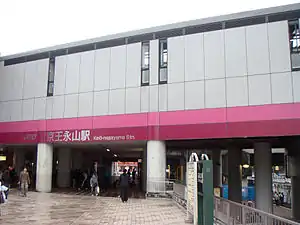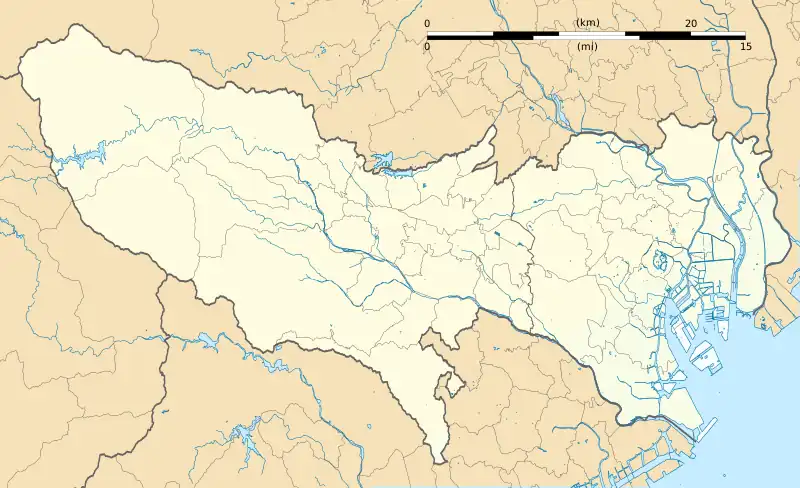Nagayama Station (Tokyo)
Nagayama Station (永山駅, Nagayama-eki) is an interchange passenger railway station located in the city of Tama, Tokyo, Japan operated jointly by the private railway companies Keio Corporation and Odakyū Electric Railway. The stations are formally known as Keiō-Nagayama (Keiō) and Odakyū-Nagayama.
 Nagayama Station 永山駅 | |||||||||||||||||||||||||||||||||
|---|---|---|---|---|---|---|---|---|---|---|---|---|---|---|---|---|---|---|---|---|---|---|---|---|---|---|---|---|---|---|---|---|---|
 Keiō-Nagayama Station | |||||||||||||||||||||||||||||||||
| General information | |||||||||||||||||||||||||||||||||
| Location | 1 Nagayama, Tama-shi, Tokyo (東京都多摩市永山1) Japan | ||||||||||||||||||||||||||||||||
| Coordinates | 35°37′48″N 139°26′53″E | ||||||||||||||||||||||||||||||||
| Operated by | |||||||||||||||||||||||||||||||||
| Line(s) | |||||||||||||||||||||||||||||||||
| Platforms | 4 side platforms | ||||||||||||||||||||||||||||||||
| Connections |
| ||||||||||||||||||||||||||||||||
| Other information | |||||||||||||||||||||||||||||||||
| Station code | KO40 (Keio), OT05 (Odakyu) | ||||||||||||||||||||||||||||||||
| History | |||||||||||||||||||||||||||||||||
| Opened | June 1, 1974 | ||||||||||||||||||||||||||||||||
| Passengers | |||||||||||||||||||||||||||||||||
| FY2019 | Keiō: 46,013 Odakyū: 31,056 daily | ||||||||||||||||||||||||||||||||
| Services | |||||||||||||||||||||||||||||||||
| |||||||||||||||||||||||||||||||||
| Location | |||||||||||||||||||||||||||||||||
 Nagayama Station Location within Tokyo  Nagayama Station Nagayama Station (Japan) | |||||||||||||||||||||||||||||||||
Lines
Nagayama Station is served by the Keiō Sagamihara Line, and is 11.4 kilometers from the terminus of the line at Chōfu and 35.6 kilometers from Shinjuku Station in downtown Tokyo. On the Odakyū Tama Line, it is 6.8 kilometers from the terminus of the line at Shin-Yurigaoka Station and 28.3 kilometers from Shinjuku Station.
Station layout
This station consists of two sets of elevated opposed side platforms serving a total of four tracks. All trains stop at this station.
Keiō Corporation (Keiō-Nagayama Station) platforms
| 1 | KO Keiō Sagamihara Line | for Keiō-Tama-Center and Hashimoto |
| 2 | KO Keiō Sagamihara Line | for Chōfu, Meidaimae, Sasazuka, and Shinjuku S Toei Shinjuku Line for Motoyawata |
Odakyū Electric Railway (Odakyū-Nagayama Station) platforms
| 1 | OH Odakyū Tama Line | for Odakyū-Tama-Center and Karakida |
| 2 | OH Odakyū Tama Line | for Shin-Yurigaoka, Yoyogi-Uehara, and Shinjuku C Tokyo Metro Chiyoda Line for Ayase JL Joban Line for Abiko and Toride |
History
- June 1, 1974: Odakyū-Nagayama Station opens as a local stop with the extension of the Odakyū Tama Line.
- October 18, 1974: Keiō-Nagayama Station opens as a local and rapid stop with the extension of the Keiō Sagamihara Line.
- December 2, 2000: Special express Homeway and express trains begin service on the Tama Line, stopping at Nagayama.
- March 27, 2001: On the Sagamihara Line, express trains begin service, stopping at Nagayama; special express trains are abolished.
- March 23, 2002: Tama Express trains begin service on the Tama Line, stopping at Nagayama.
- December 11, 2004: Section semi-express trains begin service on the Tama Line, stopping at Nagayama.
- March 2006: Odakyū-Nagayama Station renewal construction completed.
- March 15, 2008: Special express Metro Homeway trains begin service on the Tama Line, stopping at Nagayama.
Passenger statistics
In fiscal 2019, the Keio station was used by an average of 46,013 passengers daily, making it the 20th busiest station in the Keio system.[1] During the same period, the Odakyu station was used by an average of 31,056 passengers daily, making it the 37th busiest station in the Odakyu system.[2]
Surrounding area
The station sits at the heart of the planned Tama New Town suburb, complementing the neighboring Tama-Center Station.
See also
References
- 1日の駅別乗降人員 [Average daily station usage figures (fiscal 2019)] (in Japanese). Japan: Keio Railway. Retrieved 6 January 2021.
- 鉄道部門:1日平均駅別乗降人員 [Average daily station usage figures (fiscal 2019)] (in Japanese). Japan: Odakyu Railway Railway. Retrieved 6 January 2021.
External links
![]() Media related to Nagayama Station (Tokyo) at Wikimedia Commons
Media related to Nagayama Station (Tokyo) at Wikimedia Commons
- Keiō Corporation - Keiō-Nagayama Station (in Japanese)
- Odakyū Electric Railway - Odakyū-Nagayama Station (in Japanese)